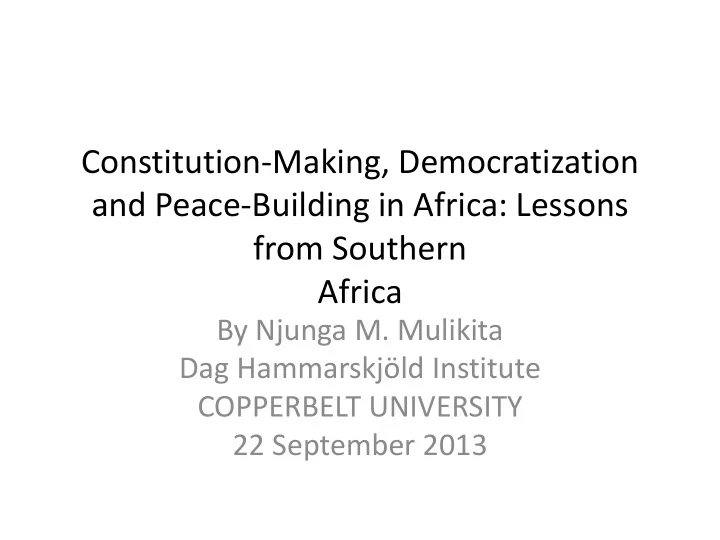

Constitution-Making, Democratization and Peace-Building in Africa: Lessons from Southern Africa By Njunga M. Mulikita Dag Hammarskjöld Institute COPPERBELT UNIVERSITY 22 September 2013
Constitution-Making, Democratization and Peace- Building in Africa 1.Introduction 2.Overview of post-Cold War Democratization Transitions in Sub-Saharan Africa 3.Constitution Making in Context of Democratic Transition & Post-Conflict Peace Building 4.Selected Experiences in Southern Africa; Namibia, South Africa, Zambia 5.Appraisal & Forward Look
Constitution-Making, Democratization and Peace- Building in Africa 1 Introduction • Post independence Africa has never suffered a shortage of experiments in constitution making • Unfortunately most of the constitutions that emerged from these experiments have been short lived • major cause of the collapse of constitutional governments in many new states was the lack of respect for the constitution among the political class’
Constitution-Making, Democratization and Peace- Building in Africa • Constitutional instability in Africa causes dictatorships, subverts democratic governance, precludes the exercise of people to constitute or change their government, and leads to gross violations of human rights and can trigger horrendous civil wars
Constitution-Making, Democratization and Peace- Building in Africa 2. Post-Cold War Democratization Transitions in Sub-Saharan Africa • Africa’s regime transitions in the 1990s usually began with popular protests • Gabon; 1990 January, students took strike action over shortages of instructors and poor study facilities • Niger; 1990 students mobilized against educational policy reforms
Constitution-Making, Democratization and Peace- Building in Africa • In countries like Ethiopia & Somalia, revolutionary movement overthrew authoritarian Marxist regime • In Zambia, 1990, food riots erupted which culminated in a failed putsch against government of President Kaunda • Zambia’s democratic transition began on the Copperbelt, heart of country’s extractive mineral sector
Constitution-Making, Democratization and Peace- Building in Africa 3 Constitution Making in Context of Democratic Transition & Post-Conflict Peace Building • As an emergency measure, certain African rulers allowed elites from Civil Society to meet in open National Forums to propose solutions to politico-economic crises • National Conferences were ad-hoc Assemblies that contained several hundred to several thousand delegates • Occurred in 11 African countries between 1990 and 1993 • National Conferences were largely Francophone constitutional reform mechanisms (Benin, Chad, Comoros, Congo, Gabon, Mali, Niger, Togo and Zaire) •
Constitution-Making, Democratization and Peace- Building in Africa • In Anglophone Countries, like Zambia, Tanzania, task of constitution-making to usher in multi- party democracy performed by Constitution Review Commission Constitution-Making in Post Conflict Transitions • Constitutional Reform became central element in building democratic societies and resolving long running conflicts
Constitution-Making, Democratization and Peace- Building in Africa Ethiopia • Similar mechanism was convened by post- Conflict Ethiopia’s interim Government in 1991 Angola • 1991 Bicesse Accords required rewriting of constitution to delink Party from State
Constitution-Making, Democratization and Peace- Building in Africa 4. Selected Experiences in Southern Africa; Namibia, South Africa, Zambia Namibia • Conflict resolution and peace building went hand in hand with constitution making via elected Constituent Assembly South Africa • Conference for a Democratic South Africa (CODESA) in 1991 promoted peacebuilding
Constitution-Making, Democratization and Peace- Building in Africa Zambia • Still grappling to come up with durable constitution • Not clear whether current Constitution-making process will resolve outstanding challenges/Contentious Clauses
Constitution-Making, Democratization and Peace- Building in Africa 5. Appraisal & Forward Look • Post-Conflict/Crisis countries better positioned to draft and enact constitutions that enjoy broad legitimacy through broadly representative Constituent Assembly(South Africa & Namibia) • Extensive public participation leads to a constitution enjoying considerable legitimacy. • Countries like Zambia, that have used State dominated modalities like CRCs, NCC etc suffer from constitutional instability & uncertainty
Recommend
More recommend